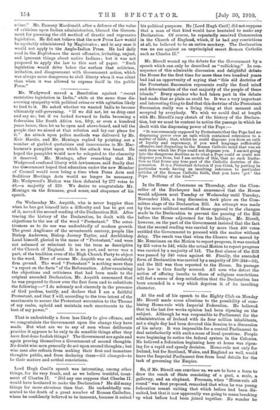Mr. Wedgwood moved a Resolution against "recent restrictive legislation in
India," while at the same time dis- avowing sympathy with political crime or with agitation likely to lead to it. He asked whether we wanted India to become ultimately self-governing. " If we did not, let us drop cant and say so ; but if we looked forward to India beooming a federation like South Africa ten, fifty, or even a hundred years hence, then let us be open and above-board, and tell the people that we aimed at that solution and lay our plans for it." An attack upon police methods was delivered by Mr. Keir. Hardie, and Mr. Montagu replied by pointing out a number of garbled quotations and inaccuracies in Mr. Mac- karness's pamphlet upon which the attack was based. He hoped the pamphlet would now be relegated to the obscurity it deserved. Mr. Montagu, after remarking that Mr. Wedgwood confused liberty with lawlessness, said finally that the Government hoped that education under the new Member of Council would soon bring a time when Press Acts and Seditious Meetings Acts would no longer be necessary. Mr. Wedgwood's Motion was then defeated by 277 votes to 48,—a majority of 229. We desire to congratulate Mr. Montagu on the firmness, good sense, and eloquence of his speech.






































 Previous page
Previous page